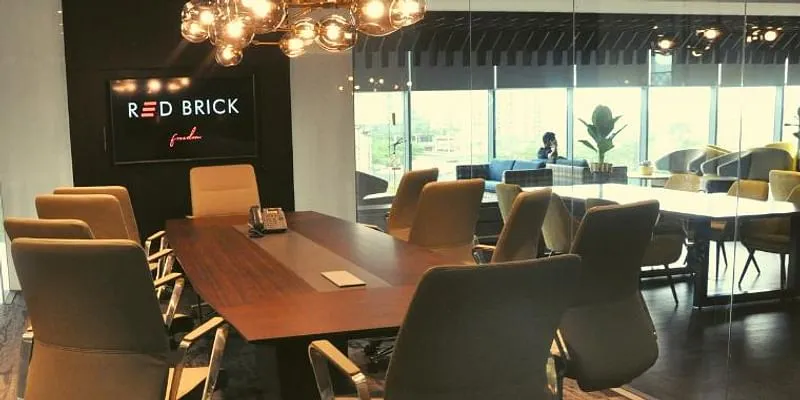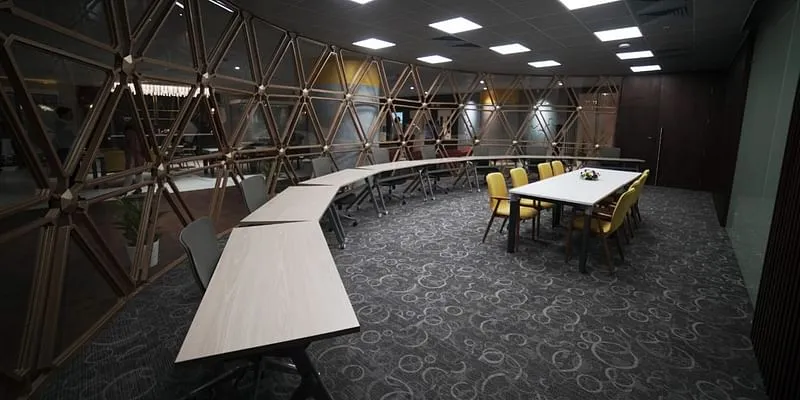With 15 centres in 3 cities, this coworking space is eyeing Rs 100 Cr turnover
Launched in Mumbai in 2015, Redbrick Offices has now expanded to Hyderabad and Pune. Ashish Goenka, Co-founder of Redbrick Offices, tells SMBStory about the company's differentiator and the challenges coronavirus will leave behind.
The popularity of coworking spaces has increased steeply over the last few years. With India becoming a hub of the world's startup ecosystem, and early entrepreneurs willing to spend less on occupying properties and paying hefty rents, coworking spaces have emerged as a viable alternative where you need to pay only for what you need.
Flexible workspaces, professional ambience, and excellent networking opportunities have made coworking spaces quite popular. Realising the potential in this business, Mumbai-based Redbrick Offices ventured into this segment.
In an interaction with SMBStory, Ashish Goenka, Co-founder of Redbrick Offices, who also heads Technology, Marketing and Strategy, says,
“Redbrick is a 40-year-old real estate business. Previously, we were more focused on residential and office construction and development projects. In 2008, our sister company Bombay Connect started one of the first coworking spaces in India. Seeing the rising popularity of coworking spaces, we thought of focusing on this business using our decades-long expertise.”

Ashish Goenka, Co-founder, Redbrick Offices
Ashish Goenka, in association with Ayush Goenka, Ranjana Goenka, and Divyush Goenka, started Redbrick Offices in Mumbai in 2015. Five years later, the company now aims to record Rs 100 crore turnover.
Edited excerpts from the interview:
SMBStory: How did Redbrick Offices enter the coworking space?
Ashish Goenka: We have been into the real estate business for the past 40 years. In the mid-90s, we built and delivered a fully furnished office tower for Citi Group (Citi Tower) in Mumbai. In 2015, we merged our sister company Bombay Connect with Redbrick to form Redbrick Offices — a fast-growing, privately held, leading coworking brand in India.
Originally, Redbrick was a landlord to various businesses, including coworking spaces like Regus and Access Coworks.
Realising the potential of the business and the skillset we had from our real-estate experience in construction, project management, hospitality, and coworking from sister company Bombay Connect, it was a natural evolution for Redbrick Offices to launch on our own.
We started in Mumbai and launched three centres in 2016. In 2017, we expanded to Hyderabad with two centres, and in 2018, we built three centres in Pune. By 2019, we had 15 centres across these three cities with Rs 16,000 rent per seat per month, and an annual run rate of Rs 100 crore.

A Redbrick Offices' coworking space in Hyderabad.
SMBS: What is the market size of your business and how are you differentiating from the competition?
AG: The commercial real estate market is estimated to be around 600 million sqft in 2019, of which coworking spaces were a mere 12 million sqft (around 2 percent). There is a fear that COVID-19 will reduce the need for commercial office stock.
Our view is that the share of coworking and serviced offices in commercial office stock will increase substantially. I would not want to guess the CRE market potential, but coworking spaces can grow more than 10x in volume over the next five years.
Redbrick’s sister company was one of the first coworking spaces in India. Redbrick has 40 years of real estate history and experience behind it. We are fully integrated — from acquisition and fixtures to fittings and hospitality — we own and operate the entire value chain of the service offering in-house. This gives us a degree of flexibility and speed that is unmatched in the sector.
We were one of the first to start building bespoke environments for our members within our coworking spaces. As much as 70 percent of our business is customised, with enterprise customers on long-term contracts.
We are a closely-held family business with no external equity funding.
SMBS: With COVID-19 you must be presented with a lot of challenges. How do you plan to sustain the business?
AG: COVID-19 has brought up a lot of challenges, with the businesses being shut. We are yet to see what challenges we have to face post the lockdown is lifted.
The other challenges mainly revolve around the burden of taxation on cash flows and high levels of compliance. While price competition was creeping into the lower-end markets for coworking spaces, the quality and standards-driven approach we follow has shielded us from that. Our model does not have a J-curve, but the long-term value proposition had been very clear until the advent of COVID-19.
The uncertainty and business environment are real challenges we will need to find answers to.

A Redbrick Offices' coworking space in Pune.
SMBS: What are your future prospects?
AG: This year will be a challenging year, but we look to the future with optimism. The coworking industry will play a very important role in the rebuilding of this economy, and we look forward to being a part of that.
I think this crisis will lead to a lot of consolidation and new business models emerging. We are confident we will emerge as one of the top five brands in space-as-a-service segment going forward.
Edited by Kanishk Singh







